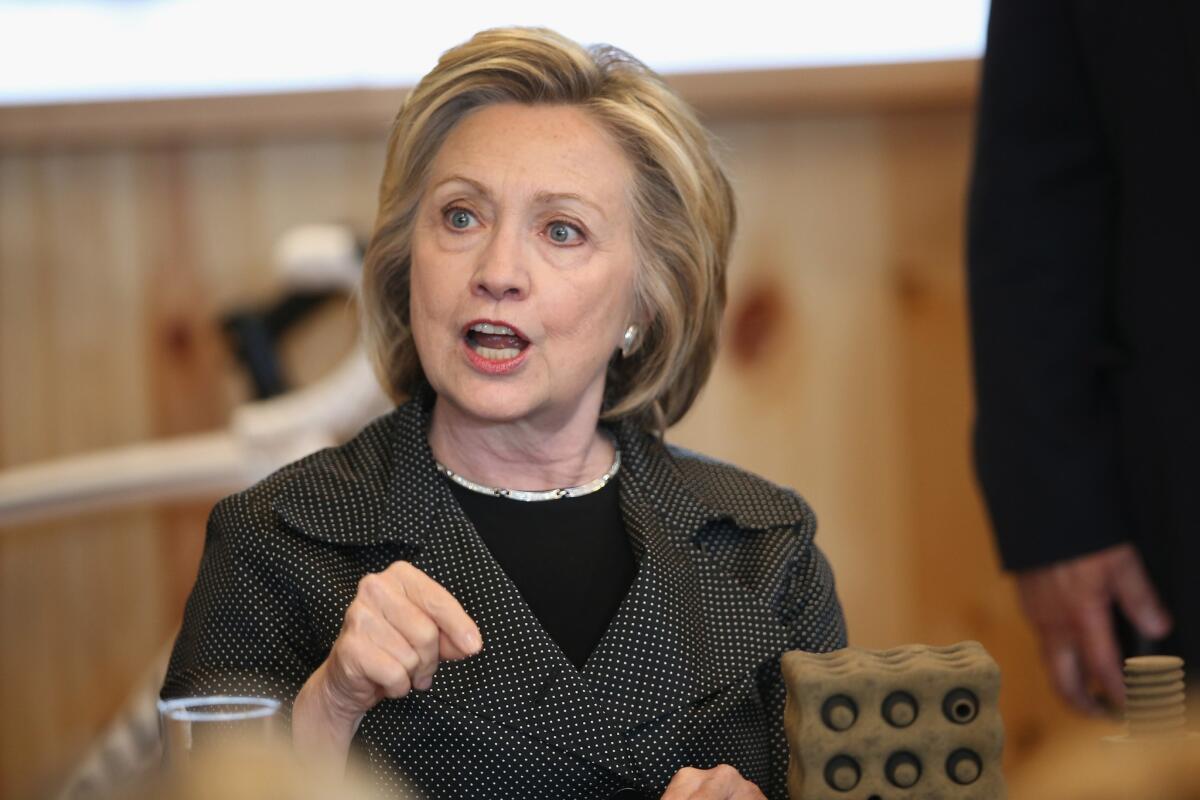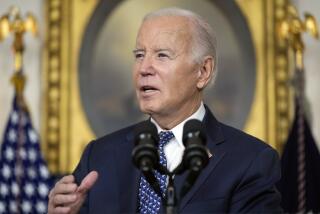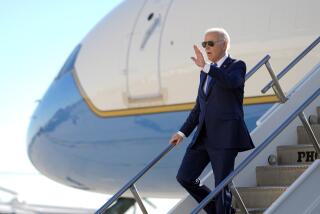Sliver of Clinton’s emails released as part of Benghazi inquiry

Hundreds of Hillary Rodham Clinton’s emails from her time as secretary of State are being released.
The State Department released 300 of former Secretary of State Hillary Rodham Clinton’s private emails on Friday, the first in a batch of 50,000 messages at the center of a tug of war between congressional Republicans and the Democratic presidential front-runner.
The emails, covering 850 pages, focus on the events surrounding the 2012 terrorist attack in Benghazi, Libya, that killed Ambassador J. Christopher Stevens and three other Americans.
Republicans leading a special House committee examining the Benghazi attack have been pushing for swift release of the emails and want to focus negative attention on Clinton’s four years as secretary of State under President Obama as she mounts a presidential run.
Clinton herself has insisted that she wants the emails released as soon as possible, though some Democratic political strategists warn that the plan for release in batches would put her under pressure to answer questions again and again over the coming months as she campaigns for president.
“I am glad the emails are starting to come out,” Clinton said Friday at a campaign stop at a New Hampshire brewery. “This is something I have asked, as you know, to be done for a long time. ... I want people to be able to see all of them.”
The State Department is planning to carefully vet and release all of the emails in batches over the coming months, following the orders of U.S. District Judge Rudolph Contreras. He denied the department’s request to prepare the entirety of the emails for release all at once in January.
The disclosure in early March that Clinton had used a private email server, in violation of federal procedures, set off a furor. Though Clinton insisted that she was following government rules on emails, a senior State Department official said recently that her use of a private email address was “not acceptable.”
The congressional committee investigating Benghazi has been pressing Clinton to testify, and has been pushing for quicker release of the documents.
Evidence to date leaves it unclear whether the emails will undermine Clinton’s claims that she never sent classified information on the private system, or will raise new questions about her conduct as the nation’s chief diplomat. Repeated congressional inquiries since 2012 have not supported claims that Clinton ignored warnings that the Benghazi mission was at risk, and the State Department insisted that continues to be the case.
“The emails we release today do not change the essential facts or our understanding of the events before, during, or after the attacks,” agency spokeswoman Marie Harf said in a statement.
Clinton maintained Friday that all relevant emails were made public.
“We have released all of them that had any governmental relationship whatsoever,” she said.
Noting that Clinton’s lawyers turned over the emails, the Republican-led House panel insisted again Friday that the rest of them be released to provide a fuller picture of the events surrounding the Benghazi attacks.
“To assume a self-selected public record is complete, when no one with a duty or responsibility to the public had the ability to take part in the selection, requires a leap in logic no impartial reviewer should be required to make and strains credibility,” the committee said in a statement.
Democrats on the committee reiterated their call for the Republicans to bring Clinton in to publicly answer questions from the lawmakers -- the cause of another standoff. Panel leaders want her to testify privately, but she has so far resisted because of concerns that her testimony will be selectively leaked to damage her presidential candidacy.
Of the initial emails, about a third -- 349 pages, published Thursday by the New York Times -- showed that Clinton and top aides were concerned about the attack and its political fallout. But the messages leave many questions unanswered.
In many of them, Clinton says little more than a short sentence or two, simply forwarding inquiries from Sidney Blumenthal, a friend and former Clinton administration aide, to State Department officials.
“Pls print,” is one common Clinton entry, asking an aide to print out a document.
In one email, Blumenthal quotes unidentified “sensitive sources” saying that the attack had been planned by Ansar al-Sharia, an Al Qaeda affiliate, and that the group had used as its cover a protest over an anti-Muslim video. “We should get this around asap,” Clinton wrote in relaying the information to Jake Sullivan, a top foreign policy advisor who was then deputy chief of staff.
In others, she might offer similarly brief thoughts as she passes on the information, sometimes skeptical, sometimes intrigued. Based on one Blumenthal memo from early 2011, she offers that the idea of using private security experts to arm Libyan opposition “should be considered.”
Blumenthal also warned Clinton that Republicans might be planning to use the Benghazi deaths to attack Obama in the months before the 2012 election. “Be sure Ben knows they need to be ready for this line of attack,” Clinton wrote Sullivan, referring to Ben Rhodes, a deputy national security advisor at the White House widely considered to be part of Obama’s inner circle.
The majority of the emails that came out Thursday do not cover the purpose of the special committee’s inquiry: the 2012 assault on the U.S. Consulate in Benghazi. But those that do indicate a Clinton operation mindful of the potential fallout from the attack, primarily to Obama’s reelection but also to herself.
In a Sept. 24, 2012, email, Sullivan sends Clinton a compilation of her public remarks on the attack to date.
“You never said spontaneous or characterized the motives. In fact you were careful in your first statement to say we were assessing motive and method,” Sullivan writes, referring to contemporary criticism of then-U.N. Ambassador Susan Rice’s public comments on the event.
Follow @richtpau and @mikememoli
More to Read
Start your day right
Sign up for Essential California for news, features and recommendations from the L.A. Times and beyond in your inbox six days a week.
You may occasionally receive promotional content from the Los Angeles Times.








